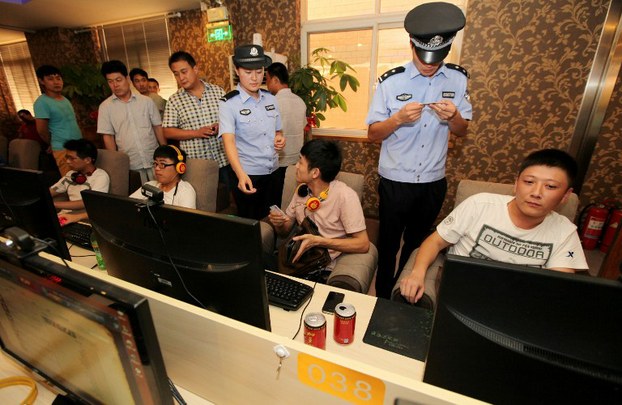Chinese police order businesses to monitor use of public wi-fi
| Publisher | Radio Free Asia |
| Publication Date | 6 April 2017 |
| Cite as | Radio Free Asia, Chinese police order businesses to monitor use of public wi-fi, 6 April 2017, available at: http://www.refworld.org/docid/58f9cbbd10.html [accessed 26 June 2017] |
| Disclaimer | This is not a UNHCR publication. UNHCR is not responsible for, nor does it necessarily endorse, its content. Any views expressed are solely those of the author or publisher and do not necessarily reflect those of UNHCR, the United Nations or its Member States. |
2017-04-06
 Police check the ID cards of netizens at an internet cafe in Shandong, China, in a file photo. ImagineChina
Police check the ID cards of netizens at an internet cafe in Shandong, China, in a file photo. ImagineChina
Authorities in the northern Chinese province of Hebei are rolling out a series of measures that will require any businesses or workplaces providing public wi-fi access to install surveillance technology that records user activity online.
A copy of the regulations issued by the police department in Hebei Tangshan city seen by RFA call on local businesses and workplaces to comply with the new requirements, which are described as "online safety protection measures," or face fines or other sanctions.
Under the rules, companies must "record and retain user registration information ... user login and exit time, caller ID, port number, account number, IP address, domain name, and system maintenance log."
They must also record and retain internet sites visited by users, using "special safety equipment," holding onto records for more than 60 days.
Shopping, catering, leisure, entertainment, public transportation, hospitals, and other public places are all required to implement the rules, purchasing government-approved equipment at their own expense, the notice said.
"Police will strengthen supervision and control of wireless networks," it said.
The measures "will prevent lawbreakers from using the internet to carry out terrorist activities, spread rumors, or spread pornographic and other illegal content," the notice said.
Keyword searches on Wednesday revealed that the same regulations have also been issued in other parts of China, including the southern province of Guangdong, suggesting that they are part of a nationwide initiative.
Clean-up operation
An officer who answered the phone at the Lunan police station in Tangshan confirmed the regulations are genuine, and aimed at companies and businesses offering public wi-fi access.
"These are effective from the date that they were made public," the officer said. "It's aimed at nonresidential wi-fi networks which must implement these technological safety measures."
But he declined to comment further, saying: "We're not allowed to carry out media interviews on our own account ... without the prior approval of the political department."
The notice comes as prominent rights activists said their social media accounts were recently deleted in an ongoing "clean-up" of online freedom of speech.
"My WeChat account was closed down ... so I couldn't even see it any more," Zha said. "There are a lot of academics I know of whose accounts were also closed after they said something online."
Veteran journalist Gao Yu said her account on WeChat had also recently been closed.
Nationwide controls
The move comes amid fears that new rules banning the use of circumvention tools to get around internet censorship in the southwestern Chinese megacity of Chongqing could soon be rolled out nationwide.
Chongqing only recently made public the new regulations, which came into effect last July and ban the city's 50 million residents from "scaling the Great Firewall."
Individuals and companies that use tools like virtual private networks (VPNs) to circumvent the complex array of blocks, filters, and human censorship that limits what Chinese internet users can see online will be ordered to disconnect, while anyone profiting from such activity will be fined, according to the Chongqing regulations.
This could include anyone seeking to read news that the ruling Chinese Communist Party regards as unflattering, businesses wanting to use blocked social media sites like Facebook, Twitter, and Google to communicate, and academics seeking access to overseas research.
The makers of WiFi Master Key, a free Chinese mobile app that allows encrypted access to public wi-fi hotspots, said last month it now has more than 900 million users, adding 100 million users in a three-month period last year.
Downloads of the app exceeded that of popular chat apps QQ and WeChat.
Reported by Qiao Long for RFA's Mandarin Service. Translated and edited by Luisetta Mudie.
Link to original story on RFA website
